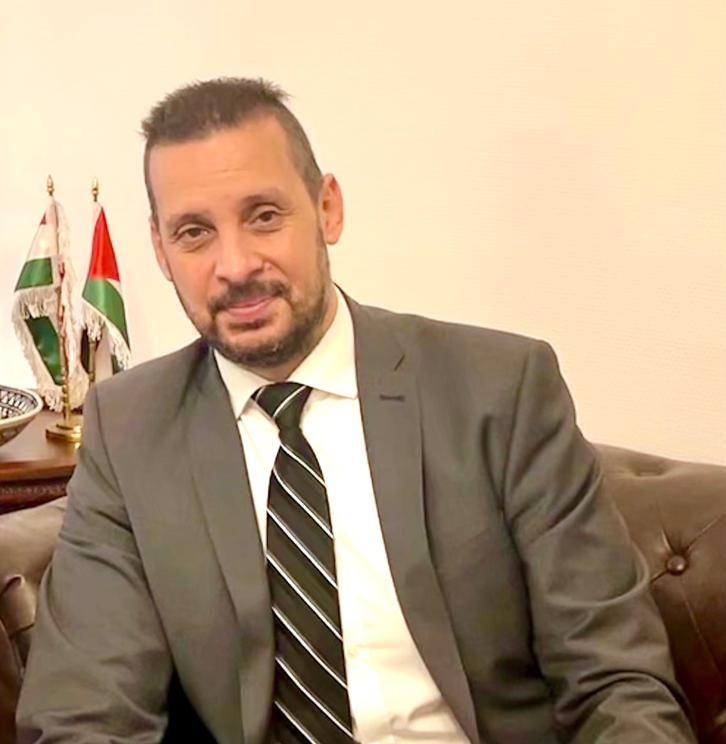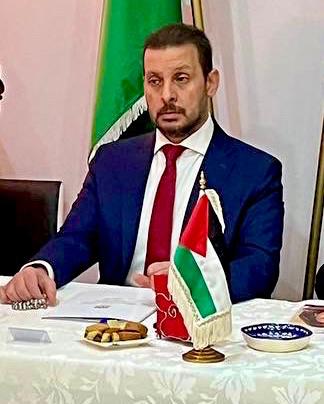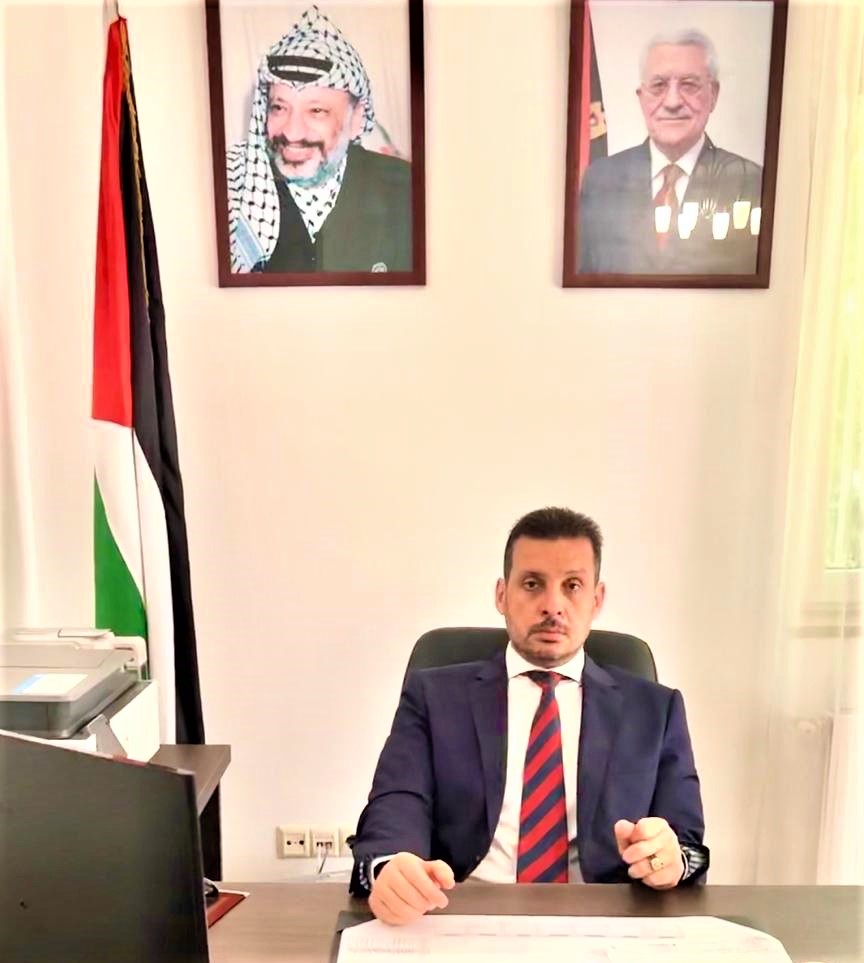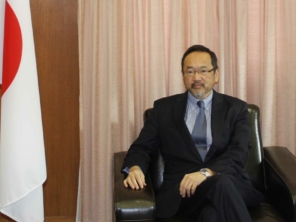Interview with Palestinian Ambassador Dr Elhusseini on Israel, Hungarian-Palestinian relations and many others
We interviewed His Excellency Ambassador Dr Fadi Elhusseini, head of the Palestinian embassy in Hungary. During the interview he touched on relations with Israel, Hungarian-Palestinian cooperation, tourism, culture and many other interesting topics:
Daily News Hungary (DNH): In what part of Palestine were you born? And what was the most memorable experience you had as a child in relation to the Palestinian-Israeli conflict?
HE Ambassador Dr Fadi Elhusseini: I was born in the city of Gaza. I grew up in a fully occupied city, watching occupation soldiers touring around the city; willing to bully, detain or harass anyone because simply had the weapons. I can recall my most memorable experience from my trip to Egypt (through Rafah Crossing). Since the occupation controls everything, one has to be checked when he leaves or returns to Palestine. Every time you see the soldiers checking your passport and documents, asking personal questions and making you feel uncomfortable or subject to arrest at any moment – these are things I could never erase from memory. Experiencing discrimination to the core; when seeing others – none Palestinians – able to pass, drive or walk when you can’t simply because you are Palestinian is another life-defying experience.
DNH: And how did you become a diplomat? It must have been challenging to grow up and receive a quality education in such a conflict-ridden place.
Ambassador Elhusseini: Challenges are always there when you are under occupation. However, I tried to face all the hardships and acquire an ample amount of education and knowledge to better serve the cause. I finished my BA in Economics & Political Science in Egypt. I obtained my MA in International Commerce Laws and policies from Italy and finished my Ph.D. in International Relations and History from England, not to mention scores of training courses in relevant fields. Believing that I would serve Palestine in the field of diplomacy, I joined, in 1998, what was known back then as the Ministry of Planning and International Cooperation – which acted as the Ministry of Foreign Affairs. Working in different departments, and serving Palestine in different embassies, my diplomatic career evolved further and I had the fortune to serve Palestine here in Hungary.

Source Palestine Embassy, Hungary
DNH: You are well aware of the conditions there. Aren’t people, whether Palestinian or Israeli, tired of decades of warfare?
Ambassador Elhusseini: I don’t believe any people on earth would wish to live in such conditions. Palestinians are like any other people in the world; they wish to live peacefully, enjoy their families, celebrate, sing, travel and experience freedom. However, sometimes things are imposed on you and your options become limited. Living under occupation wasn’t an option… seeking freedom eventually is not an option either.
DNH: What do you think would be the three most important points of a possible agreement between the two countries that would result in a much calmer climate?
Well, your question is so much to the point. I will tell you the magical recipe that would not only result in a more stable climate but would also resolve the entire conflict: END ILLEGAL OCCUPATION. The moment Israel realises that ending its occupation is the key element in the whole equation, not only Palestine but the whole region will have a chance for a brighter future. Opportunities for stability and prosperity will not exclude anyone. The rest are just details and repercussions.
DNH: We know very well that the Hungarian and Israeli governments are very close. What about political and business relations between Hungary and Palestine?
Ambassador Elhusseini: On politics, relations have been and will always be good, yet differences in views and assessments can occur. Palestine and Hungary have been always on good terms. Palestine opened an office in Budapest in 1975 and the office enjoyed diplomatic status in 1982. In 1988, Hungary became one of the first nations to recognise Palestine and the office became a fully-fledged embassy. Both nations share a many common values, similar experiences and views on plenty of issues, particularly what relates to occupation, population and expatriates (refugees), family and even attempts to nullify national sovereignty by imposing certain educational conditions. This background explains the Palestinian dismay by certain statements and positions that were neither backed by common values and shared background nor based on international law and UN resolutions. On Business relations, the figures for trade and investments are modest when compared to our rich history and relations. However, we are working ardently to change this unsatisfactory condition and soon the new numbers will be louder than any words.

Source: Palestine Embassy, Hungary
DNH: Can you mention a few examples of their cultural cooperation?
Ambassador Elhusseini: In the embassy of Palestine, we believe that culture is a universal language. We reckon that introducing our culture and history to Hungarians is a duty and introducing Hungarian culture to Palestinians is a must-learning experience. We work closely with Hungary’s representative office in Palestine to develop cultural cooperation between the two countries, either through agreements or cultural events. In Hungary, we have participated in and organised numerous cultural activities throughout the past two years. We use Social Media platforms as well to introduce our culture, history, traditions and much more. Many events that are aimed at introducing our culture are scheduled in the upcoming period and ads will be posted so everyone can come and get a taste of the Palestinian culture. In addition, Palestine enjoys educational scholarships (Stipendium hungaricum) and every year we have Palestinian students either joining or graduating from Hungarian universities. We are happy that each student returning to Palestine is taking with him or her memories and experience in Hungary. In return, Palestine offers scholarships to Hungary and we do always encourage Hungarians to join. This is how we build more bridges between our people.
DNH: Palestine has a number of biblical sites. Could you list the most notable ones for us?
Ambassador Elhusseini: Palestine – all of Palestine is a biblical site – it is the holy land… it is the birthplace of Jesus and it is where Jesus lived, walked and preached. Aside from trees, mountains, routes and places where Jesus lived or walked through, I would say the church of the Nativity in Bethlehem (where Jesus was born), the Church of the Holy Sepulcher in the Old City of Jerusalem (contains two sites considered holy in Christianity: the site where Jesus was crucified and Jesus’s empty tomb, which is where he was buried and resurrected) and also the Mount of Temptation in the city of Jericho (Christian tradition identifies it as the location of the temptation of Jesus).
DNH: What other tourist destinations do you suggest to Hungarian tourists?
Ambassador Elhusseini: I would always recommend visiting Al-Aqsa mosque in Jerusalem, the third most important site for Muslims where Prophet Muhammad (pbuh) reached at the end of his night journey, or Isra, from the sacred mosque of Makkah. So, in addition to Jerusalem, Bethlehem and Jericho, visit Ramallah, a vibrant city where history embraces modernity, where you can admire modern shopping malls and old city markets, where a tourist can enjoy classic music and Orchestra next to modern nightlife. Throughout the day, you can also visit museums and exhibitions. There are other cities where tourists can find ancient places and business hubs like Hebron, Nablus, Gaza and Jenin.
DNH: There is no international airport in Palestine. How can we get there from Budapest?
Ambassador Elhusseini: The best way is through Jordan. Flights to Jordan are frequent and the airport is one hour from the borders. If the tourists decide to take this route, they will be guaranteed to touch the lowest point on earth and see the Mount of Temptation (Jericho) upon entering Palestine.

Source: Palestine Embassy, Hungary
DNH: Palestine and Hungary are relatively far apart. Do you think Palestinians know some tidbits about Hungary?
Ambassador Elhusseini: There is some knowledge but not enough. I believe that much work is needed to build bridges and to make the Palestinians know more about Hungary, its history and culture. As such, tourism must be boosted, and in parallel, exchange programmes, scholarships, institutional visits, cultural activities and films must be organised and this is what we are working on.
DNH: How would you describe the Palestinian community in Hungary?
Ambassador Elhusseini: The Palestinian community consists of a few hundred souls, in addition to hundreds of students. We have Palestinian businessmen, engineers, doctors and other individuals who work in different professions. What I can assure you is that despite the fact that the Palestinian community is not big in size – compared to other communities– it is a vibrant, and active part of Hungarian society. Many of them were honoured by the Hungarian government for their extraordinary contributions, and others were listed among the most influential personalities in Hungary.
DNH: What are the three things you will miss most about Hungary once your posting is over?
Ambassador Elhusseini: Being away from Hungary has become hard already. However, I would say that the people and their warmth are the first things I will miss. The tranquility of walking along the shore of the Danube is another thing I will never forget. The beauty of the city and the essence of a rich history that rises from every castle, cathedral or building are definitely things that will accompany me for the rest of my life.

Read alsoJapan’s ambassador to Hungary on mutual relations, Bartók-Kodály-Liszt music, North Korea and more – INTERVIEW
please make a donation here
Hot news
What happened today in Hungary – 26 July, 2024
Drama: number of births in a 20-year low in Hungary
Yay or nay? – 6 odd Hungarian delicacies that make our skin crawl
Budapest tourism “exploded” this past weekend
Container transport in Budapest may stop: How will this affect Hungarian economy?
Minister: Hungary will protect its territory by every means possible



